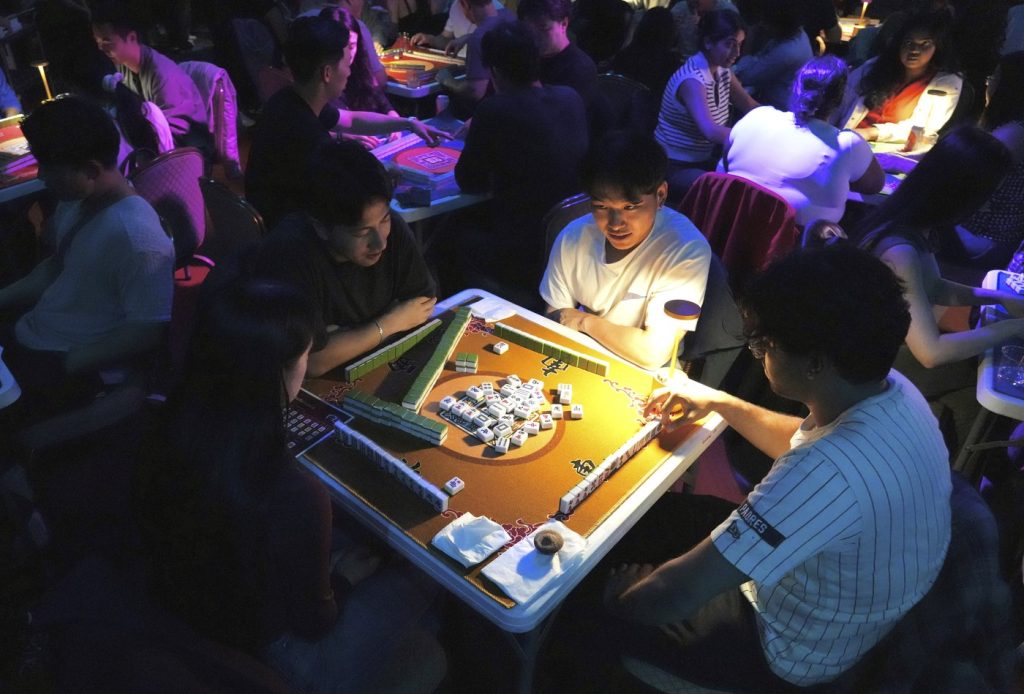World
Young Players Revive Mahjong in San Francisco’s Social Scene

San Francisco is witnessing a resurgence of interest in mahjong, the classic Chinese tile game, as young adults flock to bars and restaurants for vibrant social gatherings. Ryan Lee, a 25-year-old Chinese American, started hosting mahjong nights in his apartment two years ago. His passion for the game quickly transformed into a series of popular pop-up events, now organized by his venture, the Youth Luck Leisure (YLL) Mahjong Club.
The club regularly hosts events that draw up to 200 guests and feature as many as 30 tables. These gatherings provide an opportunity for players to immerse themselves in the game while enjoying a festive atmosphere complete with live DJs, custom cocktails, and the chance to connect with new friends. Lee remarks on the appeal of the game, stating, “A lot of people are just really intrigued even though they don’t really know how to play. There’s a cultural component they’re trying to connect with.”
The growing popularity of mahjong is reflected in recent data from Eventbrite, which reported a significant 179% increase in mahjong events across the United States from 2023 to 2024. This trend aligns with a broader interest among younger generations in offline activities often referred to as “grannycore,” which includes baking workshops and needlework circles.
Connecting Generations and Cultures
Mahjong involves four players drawing and discarding tiles to create winning hands. The game is not only about strategy but also fosters community engagement. Nicole Wong, a writer and audio producer from Oakland, highlights this aspect, saying, “It’s a really tactile game, and it’s really a social game. It really easily builds community among people.” Wong learned to play during visits to her grandparents in New Zealand and has since embraced the game’s cultural significance.
In 2019, she launched The Mahjong Project, which includes an instructional guide and oral history inspired by her family’s love for the game. Her recent publication, “Mahjong: House Rules from Across the Asian Diaspora,” explores the game’s history and various styles of play. Wong notes a growing interest among Asian Americans to connect with their heritage, which is becoming more prominent compared to previous generations.
Since its inception last year, YLL Mahjong Club has hosted nearly 20 events in San Francisco. Lee views these gatherings as an opportunity to introduce mahjong to a wider audience while also supporting local businesses. With plans for expansion to other U.S. cities, the demand for these events is clearly on the rise. “It’s not just an interest to learn how to play mahjong, but to find a third space or another community to do things with,” said Lee, who is also a management consultant.
Community and Learning
Joyce Yam, the sponsorship manager for YLL Mahjong Club, plays a crucial role in organizing the events, which often sell out quickly, leaving long waiting lists. “We welcome people who have no experience at mahjong at all, and we have teaching assistants who guide them through the game. They love it so much that they keep coming back,” Yam explained.
Ethan Vuong, a Florida native residing in San Francisco, found mahjong to be a meaningful way to connect with his Chinese heritage. He is a regular participant at events hosted by YLL Mahjong Club and Oakland’s Baba House, where he volunteers to teach newcomers. Vuong emphasizes the personal aspect of the game, stating, “It’s not just a skill or mechanics-based game, it’s an expression of your personality. I just keep playing because I have this goal that I’m going to beat my grandma one day.”
As mahjong continues to thrive in San Francisco, the combination of cultural nostalgia and community building is revitalizing interest in this historic game, attracting a young and diverse crowd eager to engage with each other beyond the confines of their screens.
-

 Politics4 weeks ago
Politics4 weeks agoSecwepemc First Nation Seeks Aboriginal Title Over Kamloops Area
-

 World5 months ago
World5 months agoScientists Unearth Ancient Antarctic Ice to Unlock Climate Secrets
-

 Entertainment5 months ago
Entertainment5 months agoTrump and McCormick to Announce $70 Billion Energy Investments
-

 Science5 months ago
Science5 months agoFour Astronauts Return to Earth After International Space Station Mission
-

 Lifestyle5 months ago
Lifestyle5 months agoTransLink Launches Food Truck Program to Boost Revenue in Vancouver
-

 Technology3 months ago
Technology3 months agoApple Notes Enhances Functionality with Markdown Support in macOS 26
-

 Lifestyle3 months ago
Lifestyle3 months agoManitoba’s Burger Champion Shines Again Amid Dining Innovations
-

 Top Stories2 months ago
Top Stories2 months agoUrgent Update: Fatal Crash on Highway 99 Claims Life of Pitt Meadows Man
-

 Politics4 months ago
Politics4 months agoUkrainian Tennis Star Elina Svitolina Faces Death Threats Online
-

 Sports5 months ago
Sports5 months agoSearch Underway for Missing Hunter Amid Hokkaido Bear Emergency
-

 Politics5 months ago
Politics5 months agoCarney Engages First Nations Leaders at Development Law Summit
-

 Technology5 months ago
Technology5 months agoFrosthaven Launches Early Access on July 31, 2025





















